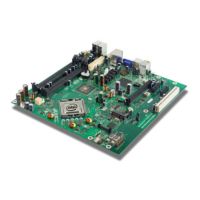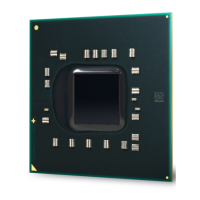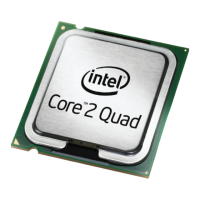Errata
34 Intel
®
Core™2 Extreme Processor X6800 and
Intel
®
Core™2 Duo Desktop Processor E6000 and E4000 Sequence
Specification Update
AI31. Performance Monitoring Events for Retired Loads (CBH) and
Instructions Retired (C0H) May Not Be Accurate
Problem: The following events may be counted as instructions that contain a load by
the MEM_LOAD_RETIRED performance monitor events and may be counted
as loads by the INST_RETIRED (mask 01H) performance monitor event:
• Prefetch instructions
• x87 exceptions on FST* and FBSTP instructions
• Breakpoint matches on loads, stores, and I/O instructions
• Stores which update the A and D bits
• Stores that split across a cache line
• VMX transitions
• Any instruction fetch that misses in the ITLB
Implication: The MEM_LOAD_RETIRED and INST_RETIRED (mask 01H) performance
monitor events may count a value higher than expected. The extent to which
the values are higher than expected is determined by the frequency of the
above events.
Workaround: None identified.
Status: For the steppings affected, see the Summary Tables of Changes.
AI32. Upper 32 bits of 'From' Address Reported through BTMs or BTSs May
be Incorrect
Problem: When a far transfer switches the processor from 32-bit mode to IA-32e
mode, the upper 32 bits of the 'From' (source) addresses reported through
the BTMs (Branch Trace Messages) or BTSs (Branch Trace Stores) may be
incorrect.
Implication: The upper 32 bits of the 'From' address debug information reported through
BTMs or BTSs may be incorrect during this transition
Workaround: None identified.
Status: For the steppings affected, see the Summary Tables of Changes.
AI33. Unsynchronized Cross-Modifying Code Operations Can Cause
Unexpected Instruction Execution Results
Problem: The act of one processor, or system bus master, writing data into a currently
executing code segment of a second processor with the intent of having the
second processor execute that data as code is called cross-modifying code
(XMC). XMC that does not force the second processor to execute a
synchronizing instruction, prior to execution of the new code, is called
unsynchronized XMC.
Software using unsynchronized XMC to modify the instruction byte stream of a
processor can see unexpected or unpredictable execution behavior from the processor
that is executing the modified code.
